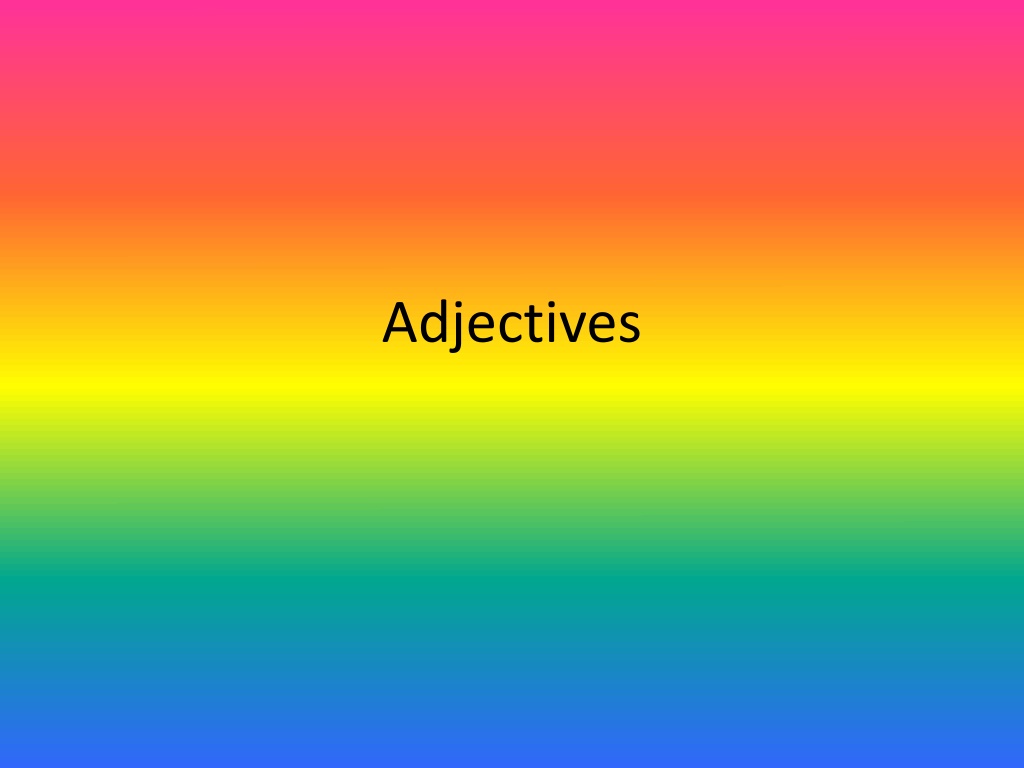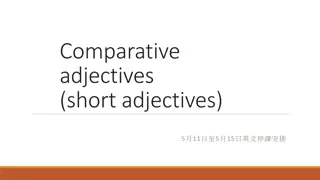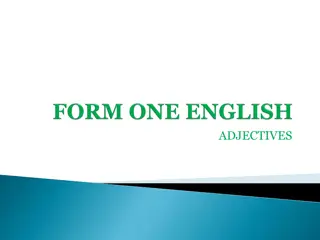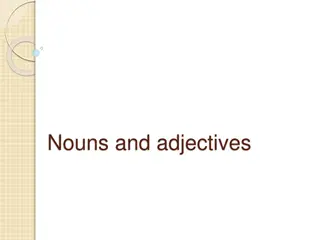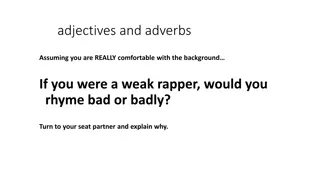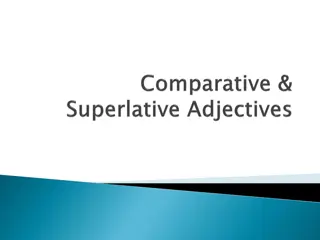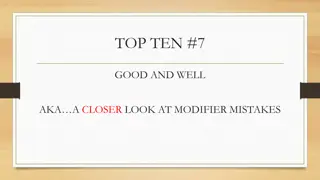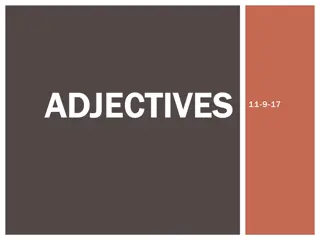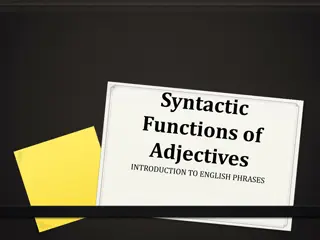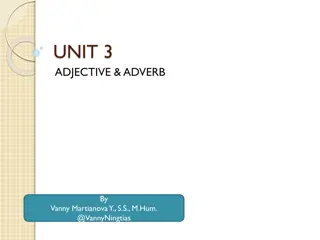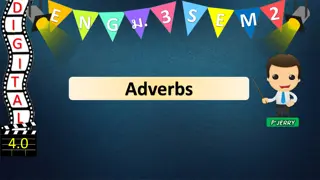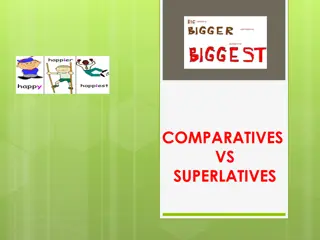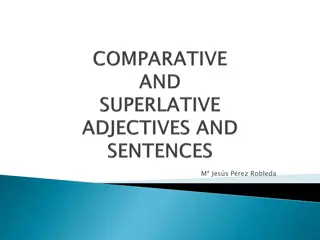Understanding Adjectives in English Grammar
An adjective is a word that describes, identifies, modifies, or quantifies a noun or pronoun. Learn about descriptive, demonstrative, possessive, and quantifying adjectives along with examples. Understand the placement of adjectives in sentences and differentiate between proper and common adjectives. Test your knowledge by identifying adjectives in sentences.
Download Presentation

Please find below an Image/Link to download the presentation.
The content on the website is provided AS IS for your information and personal use only. It may not be sold, licensed, or shared on other websites without obtaining consent from the author. Download presentation by click this link. If you encounter any issues during the download, it is possible that the publisher has removed the file from their server.
E N D
Presentation Transcript
An adjective is a word that describes, identifies, modifies, or quantifies a noun or a pronoun. Adjectives that describe are probably the easiest: Dean Cain is dark tall gorgeous rich
More descriptive adjectives blue sky young girl funny man nervous woman delicious food new dress
But dont forget that besides describing nouns & pronouns, adjectives can identify them: Which man? That man? No, the other man. All three highlighted words are adjectives that identify the noun. It shouldn t surprise you that this is called a DEMONSTRATIVE adjective, since you learned in the pronoun presentation that, when this replaces a noun, it s a demonstrative pronoun. Likewise, you shouldn t be surprised to learn that the following adjectives are called POSSESSIVE adjectives: my house your car her friends
And remember that adjectives also quantify nouns or pronouns: two puppies many children several tests Adjectives normally come before the noun/pronoun that they describe/quantify/modify, but occasionally they come after: The woman is tall. Tall describes woman. We painted the house blue. Blue describes house.
Two final notes: First, the words a, an, & the are considered adjectives, although they re better known as articles. But when you re assigning words to one of the 8 parts of speech, adjective is the category where they go. Second, just as there are proper & common nouns, there are proper & common adjectives. Proper adjectives normally come from proper nouns: I went to Italy because I love Italian food. Italy is a proper noun, & Italian is a proper adjective. We bought a Victorian house. (Meaning a house built during the reign of England s Queen Victoria.) If you mastered nouns & pronouns in the last 2 presentations, you should find adjective identification a piece of cake. If you think a word is an adjective, there HAS to be a noun or pronoun that the adjective describes/modifies/identifies. So let s see how you do: The man in the gray suit does not know a thing. Click on the adjective in the above sentence. (In this exercise, articles don t count, so don t click on an article.)
NO. That word is NOT an adjective. It does not describe/identify/modify a noun or pronoun.
Click on the adjective. (In this exercise, articles don t count, so don t click on an article.) She insists on doing whatever she wants every day.
NO. That word is NOT an adjective. It does not describe/identify/modify a noun or pronoun.
Click on the adjective. (In this exercise, articles don t count, so don t click on an article.) If you really wanted to see your sister, you could make time for her.
NO. That word is NOT an adjective. It does not describe/identify/modify a noun or pronoun.
Yes! Your is a POSSESSIVE adjective that identifies sister. BTW, if you chose really, what noun or pronoun does that go with? Does really identify/describe you ? Or sister ? Or time ?
Click on the adjective. (In this exercise, articles don t count, so don t click on an article.) I know that you want to give the guy money, but that isn t a good idea.
NO. That word is NOT an adjective. It does not describe/identify/modify a noun or pronoun.
Yes! Good describes idea. BTW, if you chose that, what noun or pronoun does that identify? The first that in the sentence comes before pronoun, but does it identify the pronoun? Which you? That you ? No. We ll talk about exactly what it is in the presentation on conjunctions, but it s definitely not an adjective, since it doesn t identify any noun or pronoun. The second that stands in place of a noun ( idea ), so it s a pronoun, not an adjective.
Click on the adjective. (In this exercise, articles don t count, so don t click on an article.) You ll know the house when you see it, because the shutters are always open in the summer.
NO. That word is NOT an adjective. It does not describe/identify/modify a noun or pronoun.
Yes! Open describes shutters in spite of the fact that open comes after shutters rather than before it.
Identify the adjectives in this excerpt from The Scarlet Letter. The young woman was tall, with a figure of perfect elegance, on a large scale. She had dark and abundant hair, so glossy that it threw off the sunshine with a gleam, and a face which, besides being beautiful from regularity of feature and richness of complexion, had the impressiveness belonging to a marked brow and deep black eyes. She was lady-like, too, after the manner of the feminine gentility of those days; characterized by a certain state and dignity, rather than by the delicate, evanescent, and indescribable grace, which is now recognized as its indication. And never had Hester Prynne appeared more lady-like, in the antique interpretation of the term, than as she issued from the prison. Those who had before known her, and had expected to behold her dimmed and obscured by a disastrous cloud, were astonished, and even startled, to perceive how her beauty shone out, and made a halo of the misfortune and ignominy in which she was enveloped. It may be true, that, to a sensitive observer, there was something exquisitely painful in it. Her attire, which, indeed, she had wrought for the occasion, in prison, and had modelled much after her own fancy, seemed to express the attitude of her spirit, the desperate recklessness of her mood, by its wild and picturesque peculiarity. But the point which drew all eyes, and, as it were, transfigured the wearer,--so that both men and women, who had been familiarly acquainted with Hester Prynne, were now impressed as if they beheld her for the first time,--was that SCARLET LETTER, so fantastically embroidered and illuminated upon her bosom. It had the effect of a spell, taking her out of the ordinary relations with humanity, and inclosing her in a sphere by herself.
If you reached this page without first having written down the adjectives from the previous page, go BACK! The young woman was tall, with a figure of perfect elegance, on a large scale. She had dark and abundant hair, so glossy that it threw off the sunshine with a gleam, and a face which, besides being beautiful from regularity of feature and richness of complexion, had the impressiveness belonging to a marked brow and deep black eyes. She was lady-like, too, after the manner of the feminine gentility of those days; characterized by a certain state and dignity, rather than by the delicate, evanescent, and indescribable grace, which is now recognized as its indication. And never had Hester Prynne appeared more lady-like, in the antique interpretation of the term, than as she issued from the prison. Those who had before known her, and had expected to behold her dimmed and obscured by a disastrous cloud, were astonished, and even startled, to perceive how her beauty shone out, and made a halo of the misfortune and ignominy in which she was enveloped. It may be true, that, to a sensitive observer, there was something exquisitely painful in it. Her attire, which, indeed, she had wrought for the occasion, in prison, and had modelled much after her own fancy, seemed to express the attitude of her spirit, the desperate recklessness of her mood, by its wild and picturesque peculiarity. But the point which drew all eyes, and, as it were, transfigured the wearer,--so that both men and women, who had been familiarly acquainted with Hester Prynne, were now impressed as if they beheld her for the first time,--was that SCARLET LETTER, so fantastically embroidered and illuminated upon her bosom. It had the effect of a spell, taking her out of the ordinary relations with humanity, and inclosing her in a sphere by herself.
